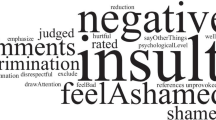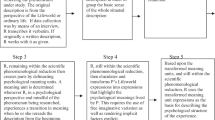Abstract
In psychological research, ressentiment is alluded to as a negative emotional response directed at social groups that are mostly marked as ‘inferior others’. However, conceptual work on this notion is sorely missing. In our conceptual proposal, we use the notion of ‘moral emotions’ as a starting point: typically referred to as “other-condemning” moral emotions (Haidt), psychologists have loosely conceptualised anger, contempt and disgust as a set of negative emotions that have distinct elicitors and involve affective responses to sanction moral misconduct of ‘others’. Though this conglomerate of different other-condemning emotions might describe emotions of ressentiment, we argue that the phenomenon itself is a more complex sentiment. Therefore, we apply Withy’s concept of ‘disclosive posture’ to account for the different psychological processes underlying ressentiment. Disclosing refers to a specific openness to the world, which in the case of ressentiment implies a specific awareness of and sensibility for instances of inequality, grudge, or disfavour. Ressentiment thus becomes a perceptual tool in morally relevant everyday situations. The term ‘posture’ refers to a habitualised, embodied comportment or action tendency that leads to the adoption of a negative attitude and stance towards others. Drawing on Withy, we discuss ressentiment’s similarities (and differences) to the closely related concept of hatred (Szanto, Vendrell Ferran) to embed the analysis of ressentiment in a broader social framework.
Similar content being viewed by others
Notes
Psychological definitions of prejudice trace back to an early conceptualisation by Allport (1954) who conceives it as a negative judgment, as an attitude towards an ‘other’, be it a group or an individual (Dovidio et al. 2010, p. 6). Importantly, Allport’s definition puts prejudice close to intraindividual, cognitive categorisation processes – a generalisation of a negatively judged ‘other’ – that are unjustified and false; prejudice is in this sense based on these processes a negative ‘dislike’ of the ‘other’ (Tuffin 2017). Importantly, and from this psychological point of view, this concept heavily conceptualises prejudice as an intra-individual phenomenon that stems from faulty cognitive processes (Dovidio et al. 2010, p. 6). This is where we draw an important line of differentiation to the concept of prejudice: We argue that ressentiment needs an affect-theoretical approach – rather than a cognitive theory – as the complexity of the phenomenon goes beyond ‘simple’ categorisation processes and can – correspondingly – not be overcome by rationalisation (“it cannot simply be thought away”, Weißgerber 2019, 225).
Ressentiment derives from the French expression “resentir” (to feel again).
Note that Scheler’s account must be criticised from a historical point of view, as his ressentiment concept centrally rests upon the claim that ressentiment is an affective disposition person of lower status develop (in contrast to persons of higher social status who are considered ‘superior’, see also Riou 2016, pp. 1–2; TenHouten 2018, pp. 2–3). His perspective does not account for the socio-political production processes of social hierarchies. We problematise this in more in detail in chapter 5 of this contribution. Though working with Scheler’s account must not affirm this perspective, his process theoretic perspective on the psychological dimension of ressentiment development still seems to offer an important conceptual perspective for grasping the phenomenon’s psychological structure, this is why we use his concept only where we find it a fruitful basis for elaborating it further.
„These forces begin by blocking only the active expression of the affects but continue by removing them from the sphere of consciousness, so that the individual or group ceases to be clearly aware of their existence. Finally, even the nascent impulse of hatred, envy, or revenge can no longer cross the threshold of consciousness. At the same time, the mass of previously repressed emotions attracts and assimilates the new affect, so that each earlier repression facilitates and accelerate the continuation of the process” (Scheler 1994, p. 42–43, emphasis added by the authors).
At this point, and with regard to the concept of “other-condemning emotions”, questions about the kind of ressentiment that condemns others but is not based in direct experience with this group, in a direct wounding, such as misogynist or anti-Semitic ressentiment may arise (we thank one anonymous reviewer for this remark!).With reference to Žižek, Weißgerber (2019, p. 231) discusses “authentic” and “unauthentic” ressentiment and argues that Žižek conceptualises authentic ressentiment “as a reaction to a wounding or injury suffered, where conventional coping through retribution, forgetting or forgiveness is impossible” (cf. Žižek 2009: 286 f., cited as Weißgerber 2019, p. 235). Importantly however, Weißgerber subsequently warns that these kinds of distinctions connect the debate to an “Ungleichheitsdiagnose” (“inequality diagnosis”): “Opposing authentic from unauthentic ressentiment does not only open up a dispute about the question of who is to blame, but also about the legitimacy of resentful self-victimisation” (Weißgerber 2019, 235; quote translated from German to English by the authors of this article). As this is not the main focus of our article, we cannot adequately address this sensitive matter; as we pointed out in the introduction, we suggest the insightful discussions by Fassin (2013) and Weißgerber (2019) for a further detailed elaboration on the possible different types of ressentiment and its origin.
Translation by the authors
Just very briefly we want to mention that this notion of getting stuck in a specific affective comportment is the reason why we do not think that ressentiment can be approached using the concept of mood. While moods also involve a fundamental openness toward the world (Freeman 2014), they are transitional affective experiences (Wrbouschek and Slunecko 2021) that revolve about change and alterity (Kenaan 2017) instead of a repetitive re-living of past experiences.
Analysing these processes is the centre stage of the collaborative research cluster „Ressentiment and Change Potential in Europe (RECHANGE)” at Sigmund Freud University of Vienna (RECHANGE Cluster). A sub-project of this research cluster, managed by PI Hametner, will especially address the question how ressentiments can become shared, i.e. collective, orientations.
References
Aeschbach, Sebastian. 2017. Ressentiment—An Anatomy [Université de Genève].
Améry, Jean. 1997. Jenseits von Schuld und Sühne: Bewältigungsversuche eines Überwältigten. Stuttgart: Klett-Cotta.
APA. 2020. PsycInfo. https://www.apa.org/pubs/databases/psycinfo/
Brunner, Markus. 2016. Vom Ressentiment zum Massenwahn. Eine Einführung in die Sozialpsychologie des Antisemitismus und die Grenzen psychoanalytischer Erkenntnis. In Schiefheilungen. Zeitgenössische Betrachtungen über Antisemitismus, ed. Charlotte Busch, Martin Gehrlein, and Tom David Uhlig, 13–35. Wiesbaden: Springer VS.
Decker, Oliver, and Elmar Brähler. 2020. 1. Autoritäre Dynamiken: Alte Ressentiments – neue Radikalität. In Autoritäre Dynamiken, ed. Oliver Decker and Elmar Brähler, 15–26. Gießen: Psychosozial.
Dovidio, John F., Miles Hewstone, Peter Glick, and Victoria M. Esses. 2010. Prejudice, stereotyping and discrimination: Theoretical and empirical overview. In The SAGE Handbook of Prejudice, Stereotyping and Discrimination, ed. John F. Dovidio, Miles Hewstone, Peter Glick, and Victoria M. Esses, 3-28. London: SAGE Publications. https://doi.org/10.4135/9781446200919.n1.
Ekman, Paul. 1973. All emotions are basic. In The nature of emotion: Fundamental questions, ed. Paul Ekman and Richard J. Davidson, 15–19. Oxford: Oxford University Press.
Ekman, Paul. 1994. The nature of emotion: Fundamental questions. Oxford: Oxford University Press.
Eiser, John R., and J. Richard Eiser. 1986. Social psychology: Attitudes, cognition and social behaviour. Cambridge: Cambridge University Press.
Fassin, Didier. 2013. The politics and ethics of moral Emotions: The Politics and Ethics of Moral Emotions. Current Anthropology. https://doi.org/10.1086/670390.
Freeman, Lauren. 2014. Toward a phenomenology of mood. The southern journal of philosophy. 52: 445–476. https://doi.org/10.1111/sjp.12089.
Haidt, Jonathan. 2003. The moral emotions. In Handbook of affective sciences, ed. Richard J. Davidson, Klaus R. Scherer, and H. Hill Goldsmith, 852–870. Oxford: Oxford University Press.
Hametner, Katharina, Sara Paloni, Natalie Rodax, and David Becker. 2020. Ressentiments as psychosocial phenomena – A critical review of recent ressentiment research. Manuscript in preparation.
Helm, Bennet W. 2009. Emotions as evaluative feelings. Emotion Review. 1: 248–255. https://doi.org/10.1177/1754073909103593.
Hoggett, Paul. 2020. The malady of the ideal and the assault on nature. Psychoanalysis, Culture and Society. 25: 213–229. https://doi.org/10.1057/s41282-019-00158-0.
Hoggett, Paul, Hen Wilkinson, and Phoebe Beedell. 2013. Fairness and the politics of resentment. Journal of Social Policy. 42: 567–585. https://doi.org/10.1017/S0047279413000056.
Honneth, Axel 1992. Kampf um Anerkennung. Zur moralischen Grammatik sozialer Konflikte. Frankfurt am Main: Suhrkamp.
Keltner, David, and James J. Gross. 1999. Functional accounts of emotions. Cognition and Emotion. 13: 467–480. https://doi.org/10.1080/026999399379140.
Kenaan, Hagi. 2017. Changing moods. Philosophia. 45: 1469–1479. https://doi.org/10.1007/s11406-017-9895-z.
Lazarus, Richard S., and Craig A. Smith. 1988. Knowledge and appraisal in the cognition—Emotion relationship. Cognition and Emotion. 2: 281–300. https://doi.org/10.1080/02699938808412701.
Mann, Robin, and Steve Fenton. 2017. Nation, class and resentment: The politics of National Identity in England, Scotland and Wales. London: Palgrave Macmillan.
Mau, Steffen. 2019. Lütten Klein: Leben in der ostdeutschen Transformationsgesellschaft. 3rd ed. Berlin: Suhrkamp.
Nachtwey, Oliver. 2016. Die Abstiegsgesellschaft: Über das Aufbegehren in der regressiven Moderne. 6th ed. Berlin: Suhrkamp.
Nietzsche, Friedrich. 2015. Jenseits von Gut und Böse. Zur Genealogie der Moral. (1886—1887). Berlin: De Gruyter. https://doi.org/10.1515/9783111469706.
Riou, Jeanne. 2016. Introduction. In re-thinking Ressentiment: On the limits of criticism and the limits of its critics, eds. Jeanne Riou and Mary Gallagher, 1–23. Bielefeld: Transcript.
Salmela, Mikko, and Christian von Scheve. 2017. Emotional roots of right-wing political populism. Social Science Information. 56: 567–595. https://doi.org/10.1177/0539018417734419.
Scheler, Max. 1912. Über Ressentiment und moralisches Werturteil. Leipzig: Wilhelm Engelman.
Scheler, Max. 1994. Ressentiment (Lewis B. Coser, William W. Holdheim, and Manfred Frings, translation; english edition). Milwaukee: Marquette University Press.
Schnall, Simone, Jonathan Haidt, Gerald L. Clore, and Alexander H. Jordan. 2008. Disgust as embodied moral judgment. Personality and social psychology bulletin. 34: 1096–1109. https://doi.org/10.1177/0146167208317771.
Slaby, Jan. 2018. Affective arrangements and disclosive postures: Towards a post-phenomenology of situated affectivity. Phänomenologische Forschungen 2018-2: 197–216. https://doi.org/10.28937/1000108209.
Szanto, Thomas. 2018. In hate we trust: The collectivization and habitualization of hatred. Phenomenology and the Cognitive Sciences. 19: 453–480. https://doi.org/10.1007/s11097-018-9604-9.
TenHouten, Warren D. 2018. From Ressentiment to resentment as a tertiary emotion. Review of European Studies. 10: 49. https://doi.org/10.5539/res.v10n4p49.
Tuffin, Keith. 2017. Prejudice. In The Palgrave handbook of critical social psychology, ed. Brendan Gough, 319–344. London: Palgrave McMillan. https://doi.org/10.1057/978-1-137-51018-1.
Vendrell Ferran, Íngrid. 2008. Emotionen und Sozialität in der frühen Phänomenologie. Über die Möglichkeiten von Frauen in der ersten Phase wissenschaftlicher Schulenbildung. Feministische Studien. https://doi.org/10.1515/fs-2008-0106, 26.
Vendrell Ferran, Íngrid. 2018. Phenomenological approaches to hatred Scheler, Pfänder, and Kolnai. In The New Yearbook for Phenomenology and Phenomenological Philosophy (Vol. 16), eds. Rodney K. B. Parker and Ignacio Quepons. https://doi.org/10.4324/9780429470141.
Vendrell-Ferran, Íngrid. 2020. Feeling of self-worth in Else Voigtländer. In Encyclopedia of Concise Concepts by Women Philosophers, eds. Mary. E. Waithe and Ruth Hagengruber. https://doi.org/10.17619/UNIPB/1-944
Voigtländer, Else. 1910. Vom Selbstgefühl: Ein Beitrag zur Förderung psychologischen Denkens. Leipzig: Voigtländer.
Weißgerber, Christian Ernst. 2019. Die neue Lust am Ressentiment Grundzüge eines affekttheoretischen Ressentiment-Begriffs. In Affekt Macht Netz. Auf dem Weg zu einer Sozialtheorie der Digitalen Gesellschaft, eds. Rainer Mühlhoff, Anja Breljak, & Jan Slaby, 225–244. https://doi.org/10.14361/9783839444399-010.
Withy, Katherine. 2015. Owned emotions: Affective excellence in Heidegger on Aristotle. In Heidegger, authenticity and the self: Themes from division two of being and time, ed. Denis McManus, 21–36. London: Routledge.
Wrbouschek, Markus and Slunecko, Thomas. 2021. Moods in transition: theorizing the affective-dynamic constitution of situatedness. New Ideas in Psychology [paper accepted for publication].
Author information
Authors and Affiliations
Corresponding author
Additional information
Publisher’s Note
Springer Nature remains neutral with regard to jurisdictional claims in published maps and institutional affiliations.
Rights and permissions
About this article
Cite this article
Rodax, N., Wrbouschek, M., Hametner, K. et al. Ressentiment As Morally Disclosive Posture? Conceptual Issues from a Psychological Point of View. Rev.Phil.Psych. (2021). https://doi.org/10.1007/s13164-021-00546-5
Accepted:
Published:
DOI: https://doi.org/10.1007/s13164-021-00546-5




